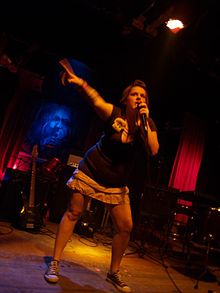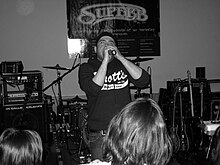| Revision as of 13:46, 5 August 2018 edit174.18.141.220 (talk) →Notable nerdcore artistsTags: Mobile edit Mobile web edit← Previous edit | Revision as of 13:49, 5 August 2018 edit undo174.18.141.220 (talk) →Notable nerdcore artistsTags: Mobile edit Mobile web editNext edit → | ||
| Line 64: | Line 64: | ||
| *] | *] | ||
| *] | *] | ||
| *] | |||
| *] | *] | ||
| *] | *] | ||
Revision as of 13:49, 5 August 2018
For the genre that fuses video game music with hardcore punk and heavy metal and is also sometimes called nerdcore, see Nintendocore. For the hardcore punk movement, see Nardcore.| This article needs additional citations for verification. Please help improve this article by adding citations to reliable sources. Unsourced material may be challenged and removed. Find sources: "Nerdcore" – news · newspapers · books · scholar · JSTOR (February 2011) (Learn how and when to remove this message) |
| Nerdcore | |
|---|---|
| Stylistic origins | |
| Cultural origins | Late 1990s, nerd culture |
| Typical instruments | |
| Other topics | |

Nerdcore is a genre of hip hop music characterized by themes and subject matter considered to be of general interest to nerds. Self-described nerdcore musician MC Frontalot has the earliest known recorded use of the term (to describe this genre) in the 2000 song "Nerdcore Hiphop". Frontalot, like most nerdcore artists, self-publishes his work and has released much of it for free online. As a niche genre, nerdcore generally holds to the DIY ethic, and has a history of self-publishing and self-production.
Though nerdcore rappers rhyme about anything from politics to science fiction, there are some perennial favorites in nerdcore subject matter, including Star Wars, Internet pornography, role-playing games, science, fantasy and computers.
Music with similar themes, but different musical styles can be found in the filk genres. There are hip hop artists who have recorded compositions which focus on similar topics, but who are not generally considered nerdcore (an example would be Blackalicious, a group which does not claim to be nerdcore, despite science-oriented songs like "Chemical Calisthenics"). Conversely, one does not need to concentrate on those topics to be nerdcore: most of the songs by Frontalot do not focus narrowly on stereotypically nerdy topics. The difference is largely one of self-identification; the group Blackalicious does not identify as "nerds", while Frontalot does.
Sound
Being more defined by lyrics, nerdcore has no unifying musical sound, and the sound of nerdcore varies wildly from artist to artist. One common theme, especially in the early days of the genre, is uncleared sampling. MC Frontalot addressed this directly in his 1999 song "Good Old Clyde", a thank you of sorts to Clyde Stubblefield for the "funky drummer" break - which was sampled to provide the song's beat. Sources for samples in nerdcore range from Vanilla Ice to Wolfgang Amadeus Mozart ("Rondo Alla Turca", in MC Plus+'s "Computer Science for Life"). YTCracker's Nerdrap Entertainment System is an entire album made up primarily of samples from 8-bit Nintendo games. Another notable artist, Random, created an album dedicated to the Mega Man video games in 2007 titled MegaRan. Though some artists have moved away from this—Frontalot, for example, completely remixed several songs to remove uncleared samples before releasing them commercially on his 2005 album Nerdcore Rising—it is still quite common, as most nerdcore tracks are released non-commercially and thus attract little to no attention from the RIAA.
Several DJs have provided beats and done remixes for multiple nerdcore artists, most notably Baddd Spellah, who currently mixes the majority of Frontalot's tracks. Spellah also won a remix competition in 2004.
History

The earliest known recorded use of the term "nerdcore hip hop" was in 2000 by MC Frontalot. However, prior to that time artists as varied as the Beastie Boys, Kool Keith, Deltron 3030, MC 900 Ft. Jesus, MC Paul Barman, Company Flow, and MF Doom began exploring topics far outside the traditional hip hop culture, including stereotypically "nerdy" topics like space and science fiction. Though these underground artists were generally outside geek culture and are not considered nerdcore, they can be said to have set the stage for artists like Frontalot, who has listed several of them as influences. The Beastie Boys outer-space sci-fi themed album Hello Nasty in 1998; including, among other potentially influencing tracks, the spacey robotic Intergalactic and the distinctively video game sound themed song UNITE; garnered mainstream recognition years ahead of the popular movement. Nerdcore had clear influences from geek culture as well, including geek rockers like They Might Be Giants, parodists like "Weird Al" Yankovic (who released a rap called "I Can't Watch This" in 1992, as well as "It's All About The Pentiums" in 1999 and "White & Nerdy" in 2006), and others. Despite these influences, nerdcore has separated itself from other types of nerdy music thanks to an unofficial list of criteria that has evolved among fans and artists. Aside from making hip hop about geeky things, nerdcore is considered to be an "opt-in" genre. Only artists who consider themselves to be "nerdcore" should have the label attached to their music.

In the summer of 2004 the fledgling genre took a large step forward when the popular web comic Penny Arcade held its first convention, The Penny Arcade Expo, in Bellevue, WA. Though the expo was primarily devoted to video and table top gaming, geek-friendly musicians also performed including Penny Arcade's "official rapper" MC Frontalot and Optimus Rhyme.
The next year, two full concerts took place at the 2005 Penny Arcade Expo and included nerdy hip hop acts MC Frontalot and Optimus Rhyme. After the 2005 expo, all three acts would have the "nerdcore" label permanently affixed to them. Thanks to the popularity of these acts, the nerdcore fan base began to form and in some cases those fans would go on to become nerdcore artists themselves.
Also in 2005, the new subgenre of geeksta rap (named for gangsta rap) emerged, largely independently of more traditional nerdcore. The difference was in both lyrics and attitude; the geeksta artists (mostly computer scientists) focused on proclaiming their prowess with computers and other technical abilities. This braggadocio led to the first nerdcore feud, between MC Plus+ and Monzy.

In 2006, nerdcore rapper Jason Z. Christie, AKA High-C created the first websites dedicated solely to the genre of nerdcore, NerdcoreHipHop.or and RhymeTorrents.com. The sites quickly became the foundation of the scene's online community. Along with the websites, High-C also created the world's first all nerdcore hip hop compilation CD. The "Rhyme Torrents Compilation" consisted of numerous volumes and dozens and dozens of tracks by various artists. Soon after the release of the cds, Nerdcore as a genre began getting mainstream press attention. High-C also appears in the film Nerdcore For Life.
Each summer since July 2008, nerdcore rappers and other nerd music acts gather in Orlando, Florida for an event named Nerdapalooza, a nerd music charity festival based on bringing various genres of "nerd music" together into one large production.
"Glitched: The Dutch Nerdcore Event" was the first major, all-nerdcore event to be held outside the United States. It took place at Club Panama in Amsterdam in February 2009 and featured the European premiere of the documentary Nerdcore For Life as well as performances of four rappers from the film, MC Lars, YTCracker, Beefy and MC Router.
Notable nerdcore artists
There is no canonical definition of nerdcore. The most general definition of a nerdcore artist would be "a rapper who is also a nerd". However, not everyone accepts this. Some limit the genre to artists who openly proclaim themselves as "nerdcore", which automatically precludes any artists who stopped recording before Frontalot coined the term in 2000. Others consider bands to be nerdcore if they are called nerdcore by other nerdcore artists. Many automatically exclude artists who have been released on a major label or had some level of commercial success, while others consider this irrelevant. Further, "notability" is somewhat hard to define in a nerdcore context, due to two facts: almost all nerdcore is self-produced and self-distributed, and the genre has not broken into mainstream success (with the small exception of MC Lars who has received limited airplay on British video channels, as well as 2 Skinnee J's "Riot Nrrrd" receiving brief airplay on U.S. alternative rock stations in the late 90's). Some notable nerdcore artists include:
- Adam WarRock
- Beefy
- Commodore 64
- Dan Bull
- Dual Core
- Iko The Rainman
- Jesse Dangerously
- JT Music
- mc chris
- MC Frontalot
- MC Hawking
- MC Lars
- MC Router
- Mega Ran
- Monzy
- NerdOut
- Optimus Rhyme
- Rockit Gaming
- Sammus
- Starbomb
- TryHardNinja
- Richie Branson
- Schäffer the Darklord
- Wordburglar
- YTCracker
- ZeaLouS1
Film

Two feature-length documentaries about the world of nerdcore hip hop were completed in early 2008, Nerdcore Rising and Nerdcore For Life. Nerdcore Rising, directed by New York filmmakers Negin Farsad and Kimmy Gatewood, follows nerdcore pioneer MC Frontalot as he embarked on his first US tour in 2006. Nerdcore For Life by Chicago director Dan Lamoureux examines the genre as a whole and contains appearances by over three dozen of the best known performers in the scene.
Nerdcore Rising premiered at the SXSW Film Conference and Festival on 9 March 2008, Nerdcore For Life at the tenth annual Wisconsin Film Festival on 5 April 2008.
See also
References
- "MC Frontalot :: Lyric :: Nerdcore Hiphop". Frontalot.com. 2007-07-19. Retrieved 2013-08-01.
- Miranda, Jeff (November 4, 2007). "Refrain of the Nerds". The Boston Globe.
- Williams, Alex (August 5, 2007). "Dungeons, Dragons and Dope Beats". The New York Times.
- "Check Me Out, I Am David Duchovny". Penny Arcade. August 30, 2004.
- "Penny Arcade Expo 2005". GamerDad. September 24, 2005.
- "Geeksta Rappers Rhyme Tech Talk". EE Times. February 13, 2006.
- "Nerdcore Artists to Release Nerd-Rap Compilation Disc". Boing Boing. April 14, 2006. Archived from the original on December 4, 2008.
{{cite web}}: Unknown parameter|deadurl=ignored (|url-status=suggested) (help) - Thomasson, Roger (November 4, 2007). "Me So Nerdy". Wired.
- "Nerdapalooza". Archived from the original on March 1, 2012.
- "GLITCHED - The Dutch Nerdcore Event". Glitched.nl. 2009-02-26. Archived from the original on 2008-10-25. Retrieved 2013-08-01.
{{cite web}}: Unknown parameter|dead-url=ignored (|url-status=suggested) (help) - "Nerdcore Rising: The Movie". nerdcorerisingmovie.com.
- "Nerdcore For Life". nerdcoreforlife.com.
Further reading
- Russell, Chris (2014). "Now Its Time for a Little Braggadocio". In DiBlasi, Alex; Willis, Victoria (eds.). Geek Rock: An Exploration of Music and Subculture. Rowman & Littlefield. pp. 161–174. ISBN 9781442229761.
- Sewell, Amanda (2015). "Nerdcore hip hop". In Williams, Justin A. (ed.). The Cambridge Companion to Hip-Hop. Cambridge Companions to Music. Cambridge University Press. pp. 223–231. ISBN 9781107037465.
| Hip-hop | |||||||||||||||
|---|---|---|---|---|---|---|---|---|---|---|---|---|---|---|---|
| Culture | |||||||||||||||
| History | |||||||||||||||
| Subgenres |
| ||||||||||||||
| Fusion genres |
| ||||||||||||||
| Derivatives |
| ||||||||||||||
| Regional scenes |
| ||||||||||||||
| Other topics | |||||||||||||||
| Nerd music | |||||||||
|---|---|---|---|---|---|---|---|---|---|
| Styles |
| ||||||||
| Festivals | |||||||||